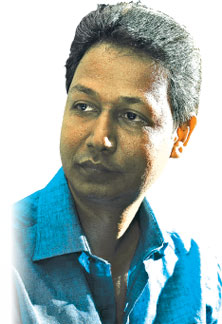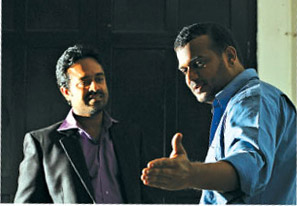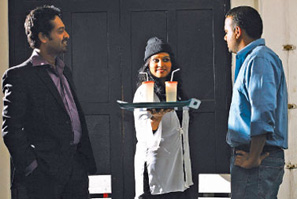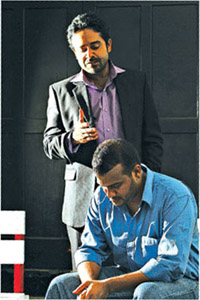When idealisms succumb to realism(s)
By Dilshan BOANGE
 The critically acclaimed Sinhala stage drama Veeraya Marila by
playwright and director Rajitha Dissanayake came alive on the boards at
the Lionel Wendt on Thursday June 7 to the delight of theatregoers in
Colombo with the versatile artist of the stage and screen Gihan de
Chickera playing the lead role. The critically acclaimed Sinhala stage drama Veeraya Marila by
playwright and director Rajitha Dissanayake came alive on the boards at
the Lionel Wendt on Thursday June 7 to the delight of theatregoers in
Colombo with the versatile artist of the stage and screen Gihan de
Chickera playing the lead role.
With a cast of veterans from contemporary stage and screen such as
Prasad Sooriyaarachchi, Dayadeva Edirisinghe, Gihan Fernando,
Dharmapriya Dias, Sampath Jayasinghe the crowd was treated to a good
performance that not just delivered potent food for thought, but also
appreciable form in the execution of a work of live performance. There
lies to a great extent the test of being able to craft the delivery of
acting, skilfully and being ‘in the skin’ of the character, to win the
appreciation and respect of a live audience where the actor has not the
luxury of going for ‘takes’ as screen acting would afford.
Romancing ideals
The protagonist is a journalist named Prabath who is presented as a
quintessential progressive believing in fighting the good fight to his
last breath, convinced that ideals of socialist progression is possible
and that he is doing his part towards that objective.
The character of Prabath comes first as a symbol of integrity and
youthful idealism whose impassioned words against oppressive corporate
exploitations are fiery and attractive. Yet the character may not seem
all that exceptional from what is meant to be seen in such persons who
believe in becoming agents for social change towards socialistic
objectives and beliefs of equity and fairness. Armed with the position
of being a ‘media man’, a journo, his character brings out the
steadfastness of a resolute journalist who believes his duty lies more
to the reader, the public, than his paymaster.
In the opening scene in what appears to be a group of police in
civvies the head of which is played by Sampath Jayasinghe, a terrorist
bomb attack is being investigated and the assailant’s identity is being
looked into to lay the preliminary grounds to begin to ascertain the
motive for the attack. A group of media men arrive to get information
about the attack and the assailant. The characters of Gihan Fernando and
Dharmapriya Dias who are from TV are marked with a difference in their
disposition towards the police officer as well as the job of reporting
as a whole.
 |
 |
|
Scenes from the play |
 While the two from electronic media present a vein for
sensationalism, coupled with the business of spotlighting and image
building of their interviewee, Prabath who is from print media and
possibly of a genre less glamorous compared to TV, maintains his
position of ‘investigative journalist’ and dwells into the matter though
it poses discomfort to the police officer. While the two from electronic media present a vein for
sensationalism, coupled with the business of spotlighting and image
building of their interviewee, Prabath who is from print media and
possibly of a genre less glamorous compared to TV, maintains his
position of ‘investigative journalist’ and dwells into the matter though
it poses discomfort to the police officer.
What occurred to me as an initial impression about the protagonist
being brought to life by de Chickera was that it seemed rather
underplayed and had an undertone which made his role appear less
prominent in the presence of Dias and Fernando. However as the story
progressed and Prabath grew as a character I saw how the possible reason
for a somewhat unobtrusiveness may have been the requirement to show
that the protagonist is not a glory hound and is meant to raise his
voice and become dramatic for a purpose of substance.
Entertainment
The roles of Fernando and Dias clearly show that they are meant to be
businessmen in the media and entertainment industry with little or no
sense of social responsibility. The role of Prabath stands out as a lone
redoubtable voice for integrity and honesty in a sector that is riddled
with crass market oriented profiteering with no regard for society’s
betterment.
Despite however much he is told his objectives are futile he clings
on dearly to his beliefs that money isn’t everything when he is offered
a lucrative position in a media corporation which of course stood for
rightwing corporate dominance.
Media industry
Dissanayake through his play has created a theatrical critique from
several vantages taking on some notably hard hitting themes. One of
these themes is how society is becoming increasingly mediatised and
depends on mass media to direct opinion generation. Prabath who comes on
as a vociferous opponent of these developments, which are of course
spearheaded by big business and further corporate interests, is finally
made to yield when he is affected financially.
What seems rather contradictory in the character of Prabath as a
‘lefty’ is that the socialist dogma he professes belief in leads him to
self defeatism because he seemed to have overlooked one very crucial
factor of what is needed of a revolutionary along the lines of
communism, and that is to abstain from the idea of the traditional
family unit which comes with a gamut of responsibilities that ties one
down to financial obligations that form the very basis for a society run
according to a capitalist system.
What is revealed of Prabath latterly and his reasons to finally take
up a position in the media corporation as a TV talk show host who
shamelessly does product endorsement, is that leaving his job at the
paper when it was taken over by the very corporation he resisted, he was
rendered helpless due to lack of income to support his family.
The hapless journo therefore, had decided to' swallow his pride,
scrap his values, discard his dogma and take up a job that paid him
well. At that point when he is projected to the audience as a vibrant TV
anchor Gihan’s theatricalising the character made a marked difference to
see the change in Prabath of before. The tones and dramatics Gihan
brought onto the stage seemed to aim at a more naturalistic manner than
what was projected by the other players in terms of presenting the more
farcical, superficial characters like the ones played by Fernando and
Dias for example.
Sincerity
Perhaps the theatricalised Prabath is meant to bring out the
superficiality and lack of sincerity or genuineness that now constitutes
the transformed personality who has sold out and bears nothing within of
what he used to be –a hero of sorts who refused to give into what he saw
as wrongness and villainy in society by those who held power; either
administrative power like the police whom he would not allow to sham the
public, or economic power like the media moguls and finance barons whom
he resisted and fought against.
The Black Civil Rights leader popularly known as ‘Malcolm X’ called
the media ‘the most powerful force on earth’, and with the growing
trends in allowing media to create heroes and villains and create
opinions of what is right and wrong in society, Dissanayake’s play
brings into discussion what society is at present and is possibly
heading towards. The most appalling turn of events would be more than
the assassination of the journo turned broadcaster Prabath on live TV is
how that very station makes it a means for sensationalism and thereby
takes a whole new business angle where SMS voting is also brought in to
the scheme of unearthing the reasons behind the killing.
The audience laughed at these developments of the story being played
out entertainingly by accomplished actors, which may show how
indifferent our society itself has become about becoming more and more
mediatised. It was possibly very telling of how immune we could become
to a slap in the face the kind the playwright deals to both mass media
and contemporary society that allows it to flourish.
Journalism and ‘journo-ism’
Although the media is thought of as a tool to inform and empower the
public, one of the common perceptions of the mass media is that it is at
times a mafia which abuses its power and barters its power for perks.
The industrialisation of mass media, both the press and electronic
media, through building on the aspects of entertainment and information
being merged to create ‘infotainment’ is pronounced rather well through
the role the protagonist plays at the very end as a talk show host.
With the characters played by Prasad Sooriyaarachchi and Dayadewa
Edirisinghe as an erudite academic and a veteran film maker
respectively, Prabath in his more theatricalised role as a broadcaster
presents the ‘acquired’ or ‘adopted’ persona to suit the job.
Moving from print to electronic gives the media man a better avenue
to bring out his persona to the public and can indeed be thought of as
more glamorous. After all there are ‘screen stars’ but no one is yet to
hear of a ‘print star’.
What seems tragic to a person like the journo Prabath is that his
journalism did not allow him to be a star to better voice his concerns
to the public in the form of a more live persona through electronic
media; and the broadcaster he becomes certainly doesn’t have any chance
to do so since he is now devoid of the mettle he possessed before and to
revert to his earlier revolutionary self would mean career suicide.
His end occurs very tragically onset during a broadcast by a gunshot
from an assassin, but the killing itself seemed needless since the death
of the ‘Veeraya’ the hero, happened sadly at the point he sold out and
became another servant to the exploitative system.
Or maybe, one may argue, the playwright believes in showing us the
perils of becoming a turncoat to the leftist cause? Perhaps the
coldblooded slaying was done not to silence a man who was a threat to
the system as was the case in the Prabath of before, but to punish a
traitor to the revolution.
Journalism as a field of work creates journalists, practitioners of
journalism who would in a manner of speaking sell their work. Yet what
becomes of journalism when the practitioner would opt to sell himself
rather than his work?
The commodity then becomes the journo and not journalism. In the ever
increasingly mediatising world of today perhaps a journo is supposed to
market himself as well, and not merely his craft alone for his
professional development.
And thus ‘journo-ism’ a form of marketing the practitioner of
journalism may arise in tandem, to mediatise society where status
becomes a saleable commodity; which hampers the credibility of a
journalist and the integrity of his work as something that ought to
stand for the truth and what benefits the people.
Stage space and stagecraft
The stage is a place where the playwright’s vision comes to life with
colour, form and flesh. Dissanayake’s critique of mass media (and
society) quite interestingly uses the very lively, up close and
personally pulsating medium of theatre present a profiling of another
media, television, which distances itself by virtue of being based on
technology that enables viewing from a great distance.
It is interesting to think from a perspective of theorising how
‘theatre’ would be a sort of antonym to TV in terms of viewer proximity.
Theatre becomes closer to a viewer’s physically realisable reality than
TV. Yet television can with its host of technological advantages bring
to the viewer vantages of a given moment either documented or performed,
which the theatre cannot.
The capacities of TV to amplify a moment of action and intensify the
effect upon the audience can be thought of as higher than theatre. The
capacity of TV to reach numerically larger audiences is far wider than
theatre. And it is a critique of this immensely powerful medium of mass
communication that the playwright builds on a stage, on a common space,
as moments altering between what is meant as moments of (the) broadcasts
and moments off screen when players play their characters as they are
and not as TV personae.
Thereby the stage becomes a ground on which the ‘on screen’ and ‘off
screen’ politics of TV are bared as though making the audience privy to
the inside (off screen) ‘drama’ of a TV station.
Dance
The inclusion of dance acts as the likes of what are found on popular
TV entertainment shows deftly executed by the lead ‘entertainers’ cum
‘media men’ played by Fernando and Dias gave a sense of the screen being
portrayed on stage. One could even by scrutinising these two characters
in particular even raise the question of where the line could be drawn
in the genre of infotainment between an entertainer and a broadcaster.
The performances of Sooriyaarachchi and Edirisinghe as guests on a
talk show (moderated by the turncoat journo turned TV broadcaster) gave
a sense of credible dimensionality of how such persons who are treated
as eruditions and authorities on subjects of art and scholarship would
give a ‘performance’ and play up to the camera when the spotlight is on
them and they are projected to a viewership beyond their visibility, and
thus given their moment of fame.
Commenting on the aspect of acting a noticeable factor was how de
Chickera’s acting carried a marked difference in tone and feel compared
to the other main figures. The theatricalism involved in building and
presenting the characters had several paces and rhythms. An example is
how Sooriyaarachchi’s role of Dr. Sena Mapalagama picks up its
theatricality and becomes a more performed persona as he becomes more
infused into the media spotlight. Yet this character doesn’t come as one
whose disposition towards the others is relaxed and natural as de
Chickera’s.
Comparisons in acting
Dias and Fernando make their characters pick up the theatrical pace
at just the right time to show in their ‘form’ how the level of
substance in their characters also change and need to be understood in
terms of the dramatic and the melodramatic. The deviant, or the oddity
in certain ways, to this picture is de Chickera. When fired up in
moments of adversity igniting arguments over political convictions the
character of Prabath becomes impassioned and dramatic.
One may even feel if the moment for performance was programmed by de
Chickera since the shift happens very sharply. But then that is possibly
the nature of the character he is supposed to bring to life to complete
Dissanayake’s directorial vision.
In the presence of Fernando and Dias, de Chickera’s character seems
somewhat eclipsed by the exuberance brought out by the duo. Between the
two Gihans, Fernando is quite obviously the more seasoned actor and Dias
too perhaps is more experienced than de Chickera, and possibly
possessing a vein more attuned to articulate the conventional
‘theatrics’ audiences would identify as being ‘theatre’.
The radical shift in the dramatisation of the character of Prabath
sprouts with the moment he ‘performs’ the role of the broadcaster who
has very much shed all semblances of his former self. Perhaps this shift
is meant to be symbolic as much as it is part of the acting style that a
theatricalised ‘performer’ has now usurped the character of the more
natural, lax persona found before. The lack of coherence or symmetry in
the acting stylistics when looking at the protagonist as before and
after selling out, may be what depicts the character’s ‘interiority’ to
be understood by the audience from a vantage beyond dialogue, is his
‘form’; apart from the verbal content. In this regard the tone, the
expressionisms carry powerful overtones to distinguish the
transformation in the character of Prabath. He seems devoid of any sense
of the personal but a ‘programmed performer’ whose every gesture is
veritably controlled to complement the task of a conscienceless product
promoting broadcaster who serves big business.
Cameos of the dead
A somewhat quirky element in the stagecraft that had been at work in
the drama is when Priyankara Ratnayake walks on to the stage from the
frontal steps and goes right past the broadcasting duo played by
Fernando and Dias not even being noticed as if though he were invisible.
Only Prabath reacts to this mysterious and unexplained intrusion onto
the stage which is of course at that point the space of the TV station.
The silent man walks around at the rear area of the stage and then
exits to a side and reappears only at the very end of the play when the
death of Prabath is announced with empathetic ‘regret’ by the station
and then instantly sensationalised.
The man, carrying a vacant gaze in his eyes says he wants to say
something and is offered the chance, since the TV show has come to a
point where public commentary is made part of the scheme.
Yet, his unfavourable comment is not allowed to get the due air time
it seeks and what is revealed to the audience is that the character
played by Ratnayake is the ghost of the man who was killed in the bomb
blast that was being investigated by the police at the start of the
play.
The man who was first thought to be the assailant and thereby
presumed a suicide bomber, but later revealed to be a mere bystander and
fallen victim to the blast.
This element of ‘magical realism’ which Dissanayake has subtly woven
into the storyline gives the audience a sudden unexpected jolt. The
conditions this apparition are not known to the characters on stage but
the audience alone. There lies I believe how the disembodied may reach
across realities; that of what is meant to be on the space of the stage
and what is outside the performing reach; the reality of the audience.
Objectives unreached and ideals betrayed
The character of Prabath symbolises the tragic hero who is broken not
physically but in his resolve through compelling circumstances that he
cannot resist alone. He symbolises that which is romantic and admirable
in idealism but may not run the full length in the face of
insurmountable adversity and thus succumb to an unpalatable realism. He
symbolises the hero who dies not a martyr but a traitor.
What can such individuals in the likeness of the character as Prabath
actually contribute towards reaching their ideals? After all he was a
journo and not an activist in the vein of a crowd activator.
He was a man whose main role was in spreading the message through the
written word. In the light of assessing the likes symbolised by the
character of Prabath one may question when has a writer through his
craft alone been the inciter, the actuator, of true revolution of the
masses; unless he takes on the role of active inciter, activator and
actuator to reach the common objective and realise the ideal?
Great writers
In his authorial preface to Mein Kampf Adolf Hitler says –“ I know
that fewer people are won over by the written word than by the spoken
word and that every great movement on this earth owes its growth to
great speakers and not to great writers.” How much of a figurehead was
Prabath in being a possible leader to a progressive movement? How
pragmatic was he if what he was able to contribute towards realising his
political beliefs was only to write and not act against the regime?
If his chief merit was to rebut pressures from the forces he despised
and merely demonstrate his resolve as a lone rebel of resistance, which
too finally was broken, may I dare ask the question that may seem
callous but perhaps reasonable in some way –how much ‘heroism’ can he be
credited to begin with? |

